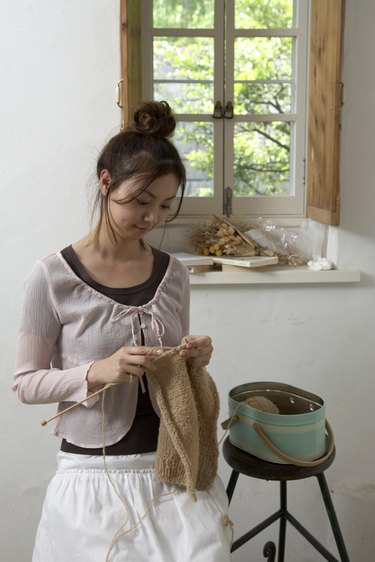Things You'll Need
Blocking board
Blocking wires or pins
Spray bottle
Water

Completing a knitting project is a satisfying experience, but sometimes that satisfaction is marred by imperfections in your finished product. One of the most common problems with home-knitted garments is that the edges do not lie flat, and instead roll up on themselves. While there are techniques to create knitted edges that do not roll, the knitter who does not employ these techniques as she works can still salvage the edges of her garment. All she has to do is spray-block the knitting when it is complete.
Step 1
Spread your garment out on a blocking board. Lay stockinette stitch projects wrong side up and all other projects right side up. Arrange the garment into the shape and measurements that you want the finished project to have.
Video of the Day
Step 2
Pin the edges to the blocking board, spacing the pins a few inches apart. If the edge rolls between the pins, add more pins to keep it straight. If you want to avoid the risk of puckering at the pinned spots, thread blocking wires through the edges of your project instead of using pins.
Step 3
Spray room-temperature water along the edges of your piece with a spray bottle. Saturate the fabric where it rolls and in any other areas you want to set into a specific shape.
Step 4
Smooth and arrange the garment with your hands into the form you want it to keep. Flatten the rolling edges carefully and evenly.
Step 5
Leave the project on the blocking board until it has dried completely. This may take two or three days. Unpin it or remove the blocking wires when the garment is dry.
Warning
Make sure your material can handle water before you spray-block. Read the label on the yarn or research the material in a knitters' manual.
Video of the Day